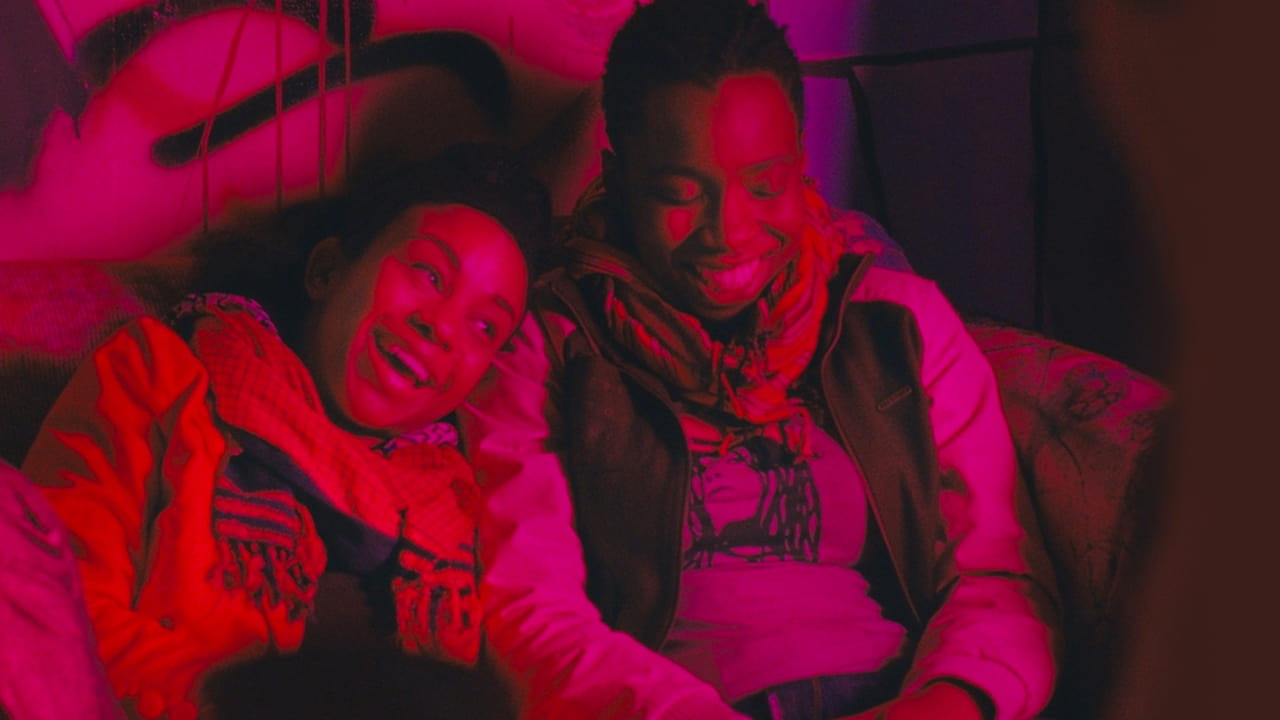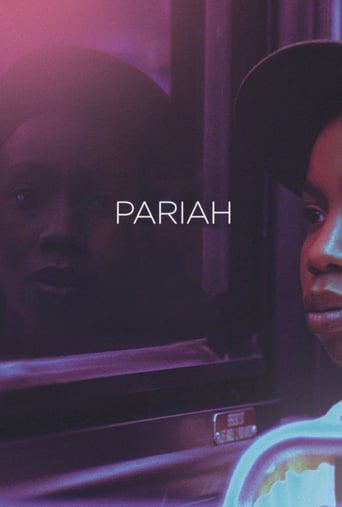

Dee Rees recently received praise for her Academy Award-nominated "Mudbound". Another good movie that she did is 2011's "Pariah", about a black teenager embracing her identity as a lesbian. Much of the movie is shot in a naturalistic style, creating an extra sense of realism. And this is one of the best examples of a true-to-life story. The characters, conflicts and dialogue are the real thing every step of the way (helped by casting unknown people in the roles). It reminded me of "Precious" and "Moonlight" in that respect.It's not a masterpiece, but the struggles faced by the characters allow the plot to unfold at a respectable pace, and the cast puts its heart and soul into the multidimensional characters. I recommend it.
... View MoreDee Rees' debut feature, a coming-out drama expanding from her 2007 short of the same name, pivots on a 17-year-old Alike (Oduye, reprises the same role), an African-American girl maladroitly explores her inchoate sexuality against a stifling familial interference. On paper, this précis is just like one of the numberless reiterations of its ilks, a bumpy journey of self-discovery, trepidation, excitement, and sorrow, mingled with temporal prejudice and religion-inflamed narrow-mindedness. But Dee Rees, against the story's well-trodden path (although, both her and Alike's ethnic attributes give its story an edge of freshness), lends Alike's bittersweet rite-of-passage a distinct flavor of probity and plausibility that refuses to sweet the pill.Little doubt is cast on Alike's self-identification as a lesbian, the meat of her day-to-day battle is with the world around her, and pointedly with her family, Audrey (Wayans), her God-bothering mother high-handedly reproves her inappropriate get-up and choice of friend, her bestie is Laura (Walker), an out-and-out butch, masking her crush by ushering Alike to the local lesbian haunts. It is not in the strobing nightspot where Alike tastes the forbidden fruit for the first time, but ironically, it is through Bina (Davis), her mother's appointed friend, the daughter of her church-going coworker, Alike fully consummates her passion, yet the very next day, hits the rock bottom of a heartbreak, Bina's mood-swing is arguably, the weakest narrative linkage in the otherwise, slow-burned drama. In due time, Alike's baptism of fire will reach the boiling point in a seminal climax when she comes out during her parents' escalating wrangle, the explosion is tempestuous and no easy reconciliation is attained afterward, but Alike, facilitated by her knack of writing, finally, she can throw off her guilt and secret, embrace a new lease on her life with resolution, she is "not running but choosing", a sagacious war cry to heighten the requisite of having a choice, for those marginalized and nonconformist. While Dee Rees and her DP Bradford Young grace the story with a raw, restive energy that best encapsulates Brooklyn's milieu of black urban teenagers, Alike's story is sustained by its self-contained environs with exclusively non-white characters, no racial tension is broached, homophobia is pandemic, in home and elsewhere, but a touching note is that among younger generations, acceptance becomes the normalcy. A factoid might completely knock one's socks off, Adepero Oduye is 33 when making this film and a further burrowing discovers that Aasha Davis, who plays her fellow high-schooler Bina, is born in 1973 (source from IMDb), it is sheer beggar belief that these actresses can pull off playing characters half their ages (a blessing bestowed to the race maybe), especially in the case of Oduye, animatedly effuses teen spirit and simmering angst in her breakthrough performance. Among grown-ups there are also worthy players, although comparatively in a lesser extent, Charles Parnell (a younger-looking Keith David, anyone?) adeptly balances his benevolent father figure with his less savory image of a miffed and cheating husband as Arthur, Alike's father; then Kim Wayans, the mega-villain in this shoestring production, is another monstrous mother figure in the spirit of Monique is Lee Daniels' PRECIOUS (2009), less blustering but equally toxic and intractable.A decisively unsentimental entry in the queer cinema and a resounding testing ground of Dee Rees' acumen and auteurist disposition, PARIAH is here to stay.
... View MoreTo watch this film is to be in the presence of a remarkable talent -- Dee Rees. This is an unusually accomplished piece of filmmaking, not simply for someone starting out, but for anyone with a couple of decades of writing and directing behind them. Ms. Rees is that good.Add to this her sensitivity and passion in exploring a young woman of color as she navigates her inner awakenings, her growing awareness of who she is. Ms. Rees handles this with the confidence of a long-time pro. And with the understanding of one who very much understands the roiling waters of her young character's dilemma.Ms. Rees handles the young actor, Adepero Oduye, with equally assured sensitivity. Ms. Oduye takes over the screen without showcasing herself, often underplaying a moment, letting us come to her. There's no 'emoting' ... for proof of the young Ms. Oduye's impressively wide range, check her out in the current Richard Gere film, The Dinner. In her scenes with Gere, Ms. Oduye dominates the frame, an old scene-stealer like Richard Gere no match for the oh-so talented Adepero Oduye. She wipes him off the screen! A smashing talent, Ms. Odoye, and smashing-looking, to boot.Though the film works for both the LGBT and (I suppose, can't speak from experience) non-LGBT audience, it is especially satisfying and heartening to see us portrayed with such unflinching honesty and understanding. With Pariah and Moonlight, directors of color are showing the way home when it comes to exploring our LGBT world.
... View More'Pariah' is the feature length expansion of a short film created by Dee Rees, presented at the Sundance Festival in 2007. It's basically a coming of age story focusing on a middle-class, black Lesbian teenager, Alike, played by Adepero Oduye. The title 'Pariah', is a bit of a strong epithet to describe Alike's situation, as she's mainly an outcast in the eyes of her mother Audrey (Kim Wayans), a devout Christian, who can't stomach the idea that her daughter is not really interested in men.'Pariah' is uniformly well-acted with a slow-moving plot that holds few surprises. In fact, take away the black middle-class environment and you'd be left with pretty much your ordinary 'coming out' tale of a conflicted gay teenager. All the stock characters are there including the 'villain' of the piece, the aforementioned intolerant mother as well as the more sympathetic police detective father, Arthur, who's not crazy about his daughter's choice of sexual orientation but still holds a special place in his heart for 'daddy's girl'. Also in the mix is Alike's best friend, Laura, who enjoys hanging out at 'rough' Lesbian clubs but eventually decides to get her GED. While Alike still enjoys a bond with one parent, Laura is not on speaking terms with her mother, who shows no interest when Laura rings her doorbell and informs her that she's passed her GED.Eventually, Alike's Mom introduces her to Bina, the daughter of one of her colleagues at work (strikingly played by Aasha Davis). The Mom finds Bina much more acceptable since she comes from a more upper class environment than what she regards as the lower class world Laura comes from. Bina invites Alike over to her house and makes it clear that she's interested in having an intimate encounter. At first Alike admits the proposition makes her uncomfortable but on a 'second date', the proposed tryst is consummated. The twist is that Bina is merely bi-curious and Alike is sorely disappointed that she won't be having an extended relationship with her for the foreseeable future. Alike's reaction is predictable: a full-scale meltdown where she trashes her own room.'Pariah' concludes also on a predictable note. Alike's Mom again chastises her for disappearing and then the parents argue over the mother's suspicion that the father has been having an affair. Alike declares her independence when she reveals to her father that she's been accepted into a creative writing program and asks his permission to sign papers so she can leave home.I suspect that deep down, 'Pariah' has garnered so many accolades not because it's a great film, but precisely because critics wish to encourage the film's creator, Ms. Rees, who apparently has much more talent as a director than a screenwriter. In terms of the writing, perhaps Ms. Rees' strongest suit is dialogue, which has a realistic, gritty feel to it. I also liked her choice of alternative rock for the soundtrack, instead of loud, rap music, which is the type of music one would expect to find in a drama of this kind.'Pariah' is a well-crafted first feature effort. You'll find very good acting here and a story that will pretty much hold your interest to the end. Nonetheless, I didn't find myself invested enough in the protagonist's journey to end up raving about the film as so many others have done. By film's end, with Alike's decision to branch off on her own, my reaction was, "okay, that's nice!" In essence, the filmmaker is saying that those who have been ostracized in society need to go forward in spite of all the criticism. But most young people must go through obstacles in order to achieve independence. Were Alike's difficulties in 'coming of age', that much different than other teenagers? Not really. Hence, I didn't feel I was watching something so 'different' or 'out of the ordinary'. It's up to Ms. Rees to next take on a project that goes beyond the world that she knows so well about and is comfortable with.
... View More